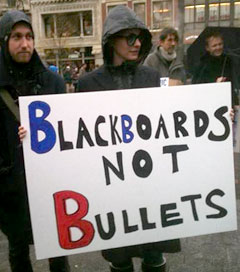If the US fought for the post-carbon economy the way it fights for nebulous state-building goals in foreign wars, the future would be brighter, cleaner, safer and cheaper, with more jobs and perhaps – because it would need to secure less of that foreign oil – fewer wars. If the country built new classrooms with the same urgency it built armored vehicles, more American teens could be choosing between colleges instead of choosing between minimum and subminimum wage jobs – and fewer would eventually need public assistance.
If the government spent more on blackboards and less on bullets, it would create more jobs today and more innovation in the future.
Neither the military nor the marketplace has proven to be the great incubator of innovation that proponents of defense spending and free markets wish to believe. Instead, both facilitate what author Malcolm Gladwell calls “tinkering” – refinements that might improve upon a big invention, rather than the big invention itself. This is not to slight tinkering: Edison's light bulb and Apple's iPod represent the kind of tinkering that can markedly affect everyday life. But those were improvements on earlier discoveries, not the world-changing discoveries, themselves (and, as has been demonstrated, not every tinkering innovation is for the benefit of the end-user).
No, if the United States truly wants to “think different” (as Apple's advertising once implored), it needs to once again embrace the innovations upon which the country was founded: Real representative democracy; transparency; accountability; checks and balances of three co-equal branches of government; no taxation without representation; trial by jury; a wariness of foreign military entanglements; and, as was added soon after Independence, access to free public education as a right. They are ideals remarkably similar to those embraced by the Occupy movement – if not assumed by most Americans to be part of their national identity.
But they are precepts that have been tarnished by the masters of the marketplace and the adherents of the military-industrial complex. Perhaps they don't need reinvention, but it appears some serious rededication is in order. If the innovation in public discourse known as Occupy Wall Street can continue to reframe the crisis, rethink the role of government and reinvigorate the democracy, then maybe America can reoccupy itself.
Help us Prepare for Trump’s Day One
Trump is busy getting ready for Day One of his presidency – but so is Truthout.
Trump has made it no secret that he is planning a demolition-style attack on both specific communities and democracy as a whole, beginning on his first day in office. With over 25 executive orders and directives queued up for January 20, he’s promised to “launch the largest deportation program in American history,” roll back anti-discrimination protections for transgender students, and implement a “drill, drill, drill” approach to ramp up oil and gas extraction.
Organizations like Truthout are also being threatened by legislation like HR 9495, the “nonprofit killer bill” that would allow the Treasury Secretary to declare any nonprofit a “terrorist-supporting organization” and strip its tax-exempt status without due process. Progressive media like Truthout that has courageously focused on reporting on Israel’s genocide in Gaza are in the bill’s crosshairs.
As journalists, we have a responsibility to look at hard realities and communicate them to you. We hope that you, like us, can use this information to prepare for what’s to come.
And if you feel uncertain about what to do in the face of a second Trump administration, we invite you to be an indispensable part of Truthout’s preparations.
In addition to covering the widespread onslaught of draconian policy, we’re shoring up our resources for what might come next for progressive media: bad-faith lawsuits from far-right ghouls, legislation that seeks to strip us of our ability to receive tax-deductible donations, and further throttling of our reach on social media platforms owned by Trump’s sycophants.
We’re preparing right now for Trump’s Day One: building a brave coalition of movement media; reaching out to the activists, academics, and thinkers we trust to shine a light on the inner workings of authoritarianism; and planning to use journalism as a tool to equip movements to protect the people, lands, and principles most vulnerable to Trump’s destruction.
We’re asking all of our readers to start a monthly donation or make a one-time donation – as a commitment to stand with us on day one of Trump’s presidency, and every day after that, as we produce journalism that combats authoritarianism, censorship, injustice, and misinformation. You’re an essential part of our future – please join the movement by making a tax-deductible donation today.
If you have the means to make a substantial gift, please dig deep during this critical time!
With gratitude and resolve,
Maya, Negin, Saima, and Ziggy
